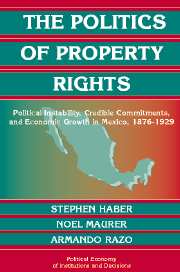 The Politics of Property Rights
The Politics of Property Rights Book contents
- Frontmatter
- Contents
- List of Illustrations and Tables
- List of Abbreviations
- Acknowledgments
- THE POLITICS OF PROPERTY RIGHTS
- 1 Introduction
- 2 Theory: Instability, Credible Commitments, and Growth
- 3 VPI Coalitions in Historical Perspective: Mexico's Turbulent Politics, 1876–1929
- 4 Finance
- 5 Industry
- 6 Petroleum
- 7 Mining
- 8 Agriculture
- 9 Conclusions
- References
- Index
- Titles in the series
1 - Introduction
Published online by Cambridge University Press: 02 December 2009
- Frontmatter
- Contents
- List of Illustrations and Tables
- List of Abbreviations
- Acknowledgments
- THE POLITICS OF PROPERTY RIGHTS
- 1 Introduction
- 2 Theory: Instability, Credible Commitments, and Growth
- 3 VPI Coalitions in Historical Perspective: Mexico's Turbulent Politics, 1876–1929
- 4 Finance
- 5 Industry
- 6 Petroleum
- 7 Mining
- 8 Agriculture
- 9 Conclusions
- References
- Index
- Titles in the series
Summary
We began this book in order to address a puzzle in political economy: why is it that political instability does not necessarily translate into economic stagnation? In the process of answering this question, we found that we had to draw on methods and approaches from what are usually thought of as three distinct disciplines: political science, economics, and history.
First, we had to develop a theory. That theory had to explore the conditions under which political violence, coupled with unpredictable and recurring change in the identity of the government, did not affect the underlying property rights system. Constructing that theory required, in turn, that we develop a theory about how governments can specify and enforce property rights as private (not public) goods. It also required that we explore the mechanisms that would make such selective commitments by governments credible – even if the identity of the government changed repeatedly.
Second, we needed to test that theory. Testing the theory required that we explore the functioning of a real-world case of such a selective property rights system under conditions of political stability and political instability. We therefore focused on Mexico, which created a selectively enforced property rights system during the long dictatorship of Porfirio Díaz (1876–1911) and which then underwent a prolonged period of revolutions, civil wars, political assassinations, and coups from 1911 to 1929.
- Type
- Chapter
- Information
- The Politics of Property RightsPolitical Instability, Credible Commitments, and Economic Growth in Mexico, 1876–1929, pp. 1 - 17Publisher: Cambridge University PressPrint publication year: 2003


